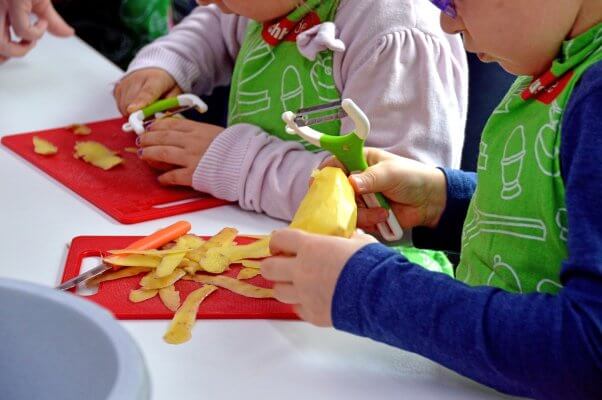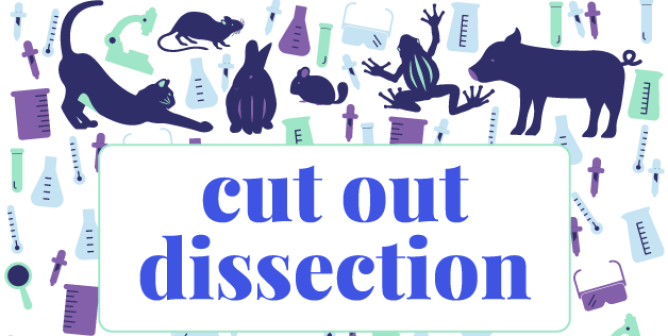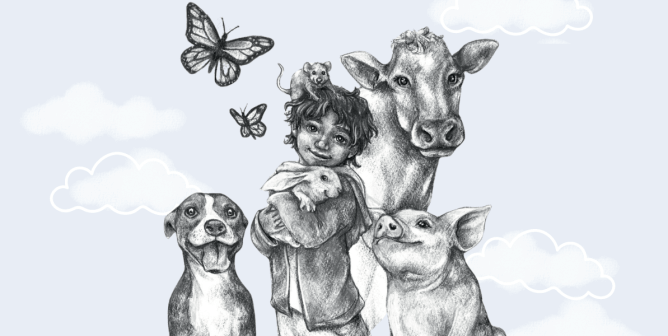Teacher Inspiration: Meet the Teacher Appreciation Contest’s Stellar Standouts
Every year, TeachKind hosts our Teacher Appreciation Contest and connects with brilliant, creative, and passionate educators who are speaking up for animals all around the country. We chose just one fabulous winner and two runners-up for the 2020 contest, but we heard from so many inspiring educators this year that we wanted to share stories about a few stellar standouts whose actions over the past school year help illustrate that any humane education effort can make a big impact when it comes to inspiring a new generation of compassionate humans.
As educators, we’re always under so much pressure to go above and beyond for our students—so don’t let the perceived added pressure of being a humane educator hinder you. You don’t have to check every single animal rights box or be “perfect” in every way in order to be an effective humane educator. Even taking seemingly small actions—like forgoing a field trip to SeaWorld, reworking a lesson plan to include an animal-friendly message, or volunteering to be the adviser for your school’s animal rights club—can make a huge difference when it comes to setting an example of compassion for students.
You also don’t need to be an expert on every single animal rights issue in order to start dismantling speciesism and speaking up in your school or classroom. Not following a fully vegan lifestyle yet? You can still teach students about the environmental harm caused by eating animal-derived foods. Unsure how to argue a case against animal testing but confident about cutting out dissection in your school? Go for it! Everyone is at a different stage of their animal rights journey, so don’t hesitate to do what feels right.
Meet three inspiring educators TeachKind connected with through this year’s Teacher Appreciation Contest whose actions over the past school year highlight ways educators can make a difference for students and animals.
Wildlife-Saving Warrior: Lisa Cox, Palm Beach Gardens, Florida

When 11th grade English teacher Lisa Cox and her students realized that they could help gopher tortoises (who are commonly found in the area and at high risk of getting hit by cars on the city’s busy freeways), they immediately jumped into action and began campaigning. The group spent months corresponding with the Florida Department of Transportation, the mayor of their city, and local environmental organizations to get miles of fencing and “Gopher Tortoise Crossing” signs installed along a busy highway in Palm Beach County, which will help keep tortoises safe.
They were inspired to get involved after noticing a problem in their local communities: that gopher tortoises were often getting hit by cars. They also made the connection that this posed a threat to drivers, too—proving that living beings are interconnected and that protecting one group benefits others. From there, Lisa and her students began brainstorming and researching ways they could help the tortoises—and once they had an idea, they began taking action. “We stayed on top of it and never gave up,” Lisa shares with TeachKind. “The kids are learning that their voices can make a difference.”
Lisa also heads up her school’s Marine and Wildlife Protection Club—a group that she founded after watching Blackfish and learning about the cruelty and exploitation animals endure in the entertainment industry. This was a huge shift for Lisa, as she had once worked as a dolphin trainer at the Miami Seaquarium. Now, she speaks openly with her students about the reasons why she’ll never support field trips to places like the Seaquarium or SeaWorld, educates them on ways they can make a difference for these animals, and empowers them to take action.
Get inspired: If you’re interested in humane education but you aren’t sure where to begin, start by looking at issues affecting animals in your local area—just as Lisa and her students did. Whether you’re addressing an issue related to wildlife (like the gopher tortoises who were getting hit by cars) or an issue related to a local animal-exploiting business (like a roadside zoo or an aquarium), empowering students to speak up for animals in their own communities can help you work animal rights into your curriculum in a relevant and tangible way while also teaching your students the power of activism and community engagement.
Humane Science Superstar: Lyndsey Rios, Beeville, Texas
Yes, This Is Actual Meat, but No Animal Died for It
High school science teacher Lyndsey Rios grew up participating in FFA and other animal agriculture programs—but after seeing a video about cruelty to animals in the meat industry, she decided to change her curriculum to help her students become more informed and compassionate scientists and consumers. That’s why this past school year, she created a curriculum that she calls the “clean meat initiative” for her pathophysiology students, which combines animal rights with the course’s assigned topics, such as cells and tissues, body systems, and biotechnology.
By sharing videos recorded inside slaughterhouses and engaging students in conversations that challenge their ethics and consumer values, Lyndsey teaches about the cruelty inherent in using animals for food as well as the unsustainability of eating meat—and she then ties this information in with the course material by having students study the process of creating “clean meat” in a lab using cell cultures. During the unit, students also designed their own posters to promote the concept of lab-grown “clean meat,” which were displayed around the school—leading to many conversations within the student body (even among students not in her classes) about minimizing meat consumption and questioning where food comes from.
Lyndsey is inspired to teach her students to make their own informed choices about what’s right and what’s wrong, and she emphasizes freedom of choice throughout her lessons. She sees firsthand the importance of teaching students to question the status quo on their own terms. “The emotions that my students shared with each other about animal cruelty [during the lessons] will always remain with them,” Lyndsey tells TeachKind of the project. “The students and I both learned that there are big choices to make when purchasing food at a local grocery store, chain store, or online. Animal rights are now being taken into consideration before products are being bought.”
Get inspired: It’s hard to find extra time in the school day to incorporate lessons about animal rights, so reworking a curriculum to tie in animal issues in a fully supported and relevant way can be a game-changer—especially for teachers who have to get lessons approved before moving forward with them. Brainstorm ways to incorporate animal issues that you’re passionate about into the subject that you teach—just as Lyndsey has done in working animal agriculture into pathophysiology via studying lab-grown meat. A little creativity can make a really big impact for animals.
Healthy Food Hero: Lauren Carp, Oak Park, Michigan

Fifth grade teacher Lauren Carp is passionate about vegan eating, and it shows—she just completed the third consecutive year of running her elementary school’s plant-based Healthy Cooking Club, which meets after school. Students learn how to cook entirely vegan meals that are good for animals, their health, and the environment. The club has become so popular and receives so many applications from students that Lauren has had to start selecting the members raffle-style.
During club meetings, students learn about healthy vegan ingredients and how to prepare them, cook them, and incorporate them into all sorts of yummy, kid-friendly recipes. They keep cooking journals in which they write down the recipes they’ve cooked and note how they turned out. The club hosts visits and cooking demonstrations from local chefs of popular vegan restaurants (which has inspired former club members to try more vegan restaurants and even to return to the club as helpers after they’ve graduated). After Lauren’s principal saw how successful and fun the Healthy Cooking Club was, schoolwide tastings in the cafeteria were arranged during the school day so that the entire student body could sample the delicious and healthy vegan snacks, like smoothies and veggie chips, that the club members were whipping up.
All of Lauren’s efforts are having a big impact on young students, as they’re opting for vegan foods over animal-derived ones both at school and at home—and they’re excited about the compassionate and healthy changes in their eating habits. “Students feel inspired to use more plants in their own diet [and to spread] the word about eating foods that are plant-based instead of animal-based,” Lauren tells TeachKind. “By the end of our after-school classes, families comment on how passionate their children are about eating more plants at home.” Through the club, students are empowered to make compassionate choices that benefit animals and their health, and they leave with the ability to prepare healthy vegan meals for their families at home.
Get inspired: If you’re passionate about an animal rights issue but don’t have the opportunity to work it into your curriculum or face opposition from your school’s administration, consider devoting some extracurricular time to starting a student group or club in which you can explore issues with students outside the classroom setting, as Lauren has done with her plant-based cooking club. By hosting a club and gathering with students during lunchtime or after school, you can explore animal rights with a little more freedom than you would otherwise, and it’s a great way to support students who are already interested in helping animals and help them connect with one another.
*****
Are you ready to up your game for next school year and start making a difference for animals? We’ve got your back: Join TeachKind’s mailing list for yearlong inspiration on incorporating kindness to animals in your classroom.
By submitting this form, you’re acknowledging that you have read and agree to our privacy policy and agree to receive e-mails from us.






